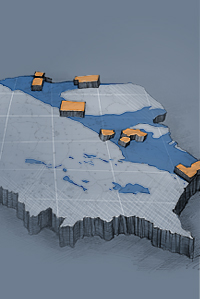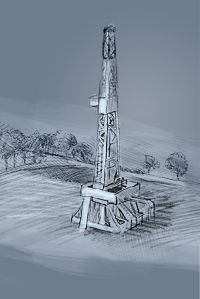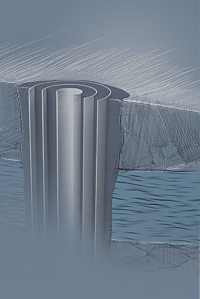Strategy for the PGNiG Group until 2015
The overarching strategic objective pursued by PGNiG is to secure growth of the shareholder value. In its pursuit of the strategy, in June 2011 the Company adopted 18 strategic objectives under the “Update of Strategy for the PGNiG Group until 2015” within the areas. The strategy will be implemented taking into consideration the need to ensure long-term security of uninterrupted supplies of natural gas to the Polish market.
PGNiG is a company with long-lasting tradition, enjoying an established position of the leader on the Polish gas market. Over the years of development, the Company has gathered valuable assets and now controls a number of segments of the energy market (natural gas production, storage, sales and distribution), which provides a robust foundation for PGNiG’s further growth and steady value increase.
The overarching strategic objective pursued by PGNiG is to secure growth of the shareholder value. In its pursuit of the strategy, in June 2011 the Company adopted 18 strategic objectives under the “Update of Strategy for the PGNiG Group until 2015” within the six areas:
- Exploration and Production,
- Wholesale/Trading,
- Storage,
- Distribution,
- Sales,
- New Business Areas.
The following main strategic objectives make up the PGNiG Group’s vision: to become, by 2015, a modern and efficiently managed organisation, control almost the entire value chain in the gas sector, and hold assets in the fuel and power sectors. Attainment of the strategic objectives will rely in particular on activities concentrating on:
- hydrocarbon exploration and production domestically and abroad, to ensure access to new oil and gas reserves;
- the power sector, focusing on the development of gas-fired power generation in Poland;
- management of the Company’s natural gas portfolio and activities on the European gas trading market.
Exploration and Production
Access to own reserves is a key to success. For this reason, PGNiG is developing its exploration and production business in Poland and abroad. The updated strategy set the following strategic objectives:
- to develop the E&P business in Poland;
- to develop the international E&P business focused on key regions;
- to enhance competences and optimise activities in the E&P business.
Actions taken to pursue these objectives include:
- increasing domestic annual production of natural gas to approximately 4.5 bn m³ and crude oil to approximately 1.0 m tonnes;
- maintaining the leading position among the holders of licences for unconventional gas exploration in Poland;
- maintaining the reserve-replacement ratio of at least 1.1.
Our achievements to-date
The majority of E&P tasks performed in 2011 focused on the exploration for and development of new fields.
As part of the exploration work and surveys conducted in 2011, the PGNiG Group drilled almost 53 kilometres of wells, acquired 1.5 thousand kilometres of 2D seismic data and over 800 km² of 3D seismic surveys in its licence areas in Poland and abroad.
The PGNiG Group seeks to become the leader in exploration for unconventional hydrocarbon resources in Poland, including shale gas and tight gas. Tests conducted in 2011 (in new exploration areas where thus far there had been little appraisal) have confirmed the presence of gas in Piaski-3 well (tight gas) in Western Pomerania, and Lubocino-1 (shale gas) in Eastern Pomerania. Further, drillings of deep boreholes were carried out in the Carpathian Mountains and Carpathian Foothills: the Kramarzówka-1 borehole was completed, and drilling of the Dukla-1 borehole started.
The key oil and gas field development projects executed in 2011 included: the LMG project (Lubiatów-Międzychód-Grotów), in which the Company invested nearly PLN 436 m in 2011, and the Grodzisk project completed in 2011, involving the development of fields and hook up of wells, upgrade of the Paproć-Cicha Góra gas production facility and construction of a denitriding plant in Grodzisk Wielkopolski (total expenditure incurred on the project was PLN 458 m).
The development of the Skarv field on the Norwegian Continental Shelf is currently the largest and most advanced project among the Company’s international exploration and production ventures. Production from the Skarv field will be launched in 2012.
Wholesale/Trading
In order to balance the domestic demand for natural gas, the PGNiG Group produces gas from its own reserves and purchases gas abroad. The Group’s own production satisfies around 30% of total demand, with the balance covered by imports, mainly from countries east of Poland (with OOO Gazprom Export being the largest supplier). The updated strategy sets the following objectives:
- to maximise the use of the existing infrastructure and secure sufficient capacities;
- to increase the flexibility of natural gas supplies;
- to develop domestic/international multi-commodity trading and international sales.
Therefore, the following steps have been or will be taken to guarantee secure and uninterrupted supplies of natural gas:
- using spare capacities of the LNG terminal, reserving capacities at the Lasów and Cieszyn interconnectors and capacities available in the virtual reverse flow on the Yamal pipeline;
- renegotiating and increasing the flexibility of long-term contracts and changing the purchase portfolio structure by increasing the share of volumes under short-term contracts;
- in the future, launching international trading in gas and crude oil to support the processes of diversifying gas supply sources and risk management, while securing competitive selling prices. Our ability to participate in the European market will be particularly important if gas surplus occurs in Poland.
Our achievements to-date
With a view to securing an appropriate structure of import contracts, in 2011 PGNiG executed new gas supply contracts.
In May 2011, PGNiG and Vitol SA concluded an Individual Agreement for natural gas supplies to a cross-border terminal on the Polish-Czech border in the Cieszyn area. Under the agreement, approximately 550 m m³ of gas per year will be delivered in the period from October 1st 2011 to October 1st 2014. The gas is supplied via a newly built interconnector between the gas systems of Poland and the Czech Republic.
In May 2011, PGNiG and VNG-Verbundnetz Gas AG executed an Individual Agreement for summer gas supplies to the Lasów cross-border terminal. Under the agreement, gas was supplied in the period from May 17th to July 3rd 2011.
In June 2011, PGNiG and VNG-Verbundnetz Gas AG executed an Individual Agreement for summer gas supplies to the Lasów cross-border terminal. Under the agreement, gas was supplied in the period from July 3rd to September 30th 2011.
Also in 2011, PGNiG reserved transmission capacity in the German transmission system in order to transport the gas purchased on the VTP Gaspool platform. The transmission capacities were reserved for the period October 1st 2011 – September 30th 2016 (Lasów cross-border terminal) and for the period October 1st 2011 – October 1st 2014 (Gubin cross-border terminal).
In September 2011, PGNiG executed three short-term EFET (European Federation of Energy Traders) standard contracts on the VTP Gaspool platform for delivery of small amounts of natural gas.
In order to transport the volumes of gas purchased on the German market (at the VTP Gaspool platform), PGNiG and OGP Gaz-System SA executed a short-term agreement for the provision of virtual reverse flow services on the Yamal gas pipeline in the period from November 1st 2011 to January 1st 2012. The gas was delivered on the basis of a series of separate transactions executed by PGNiG Sales & Trading GmbH.
PGNiG Sales & Trading GmbH of Munich was established to engage in international trading in natural gas and crude oil. Through this new company, PGNiG intends to launch gas trading on the European market starting in 2012, offering own gas produced from the Skarv field (Norway).
 Click to enlarge
Click to enlarge



